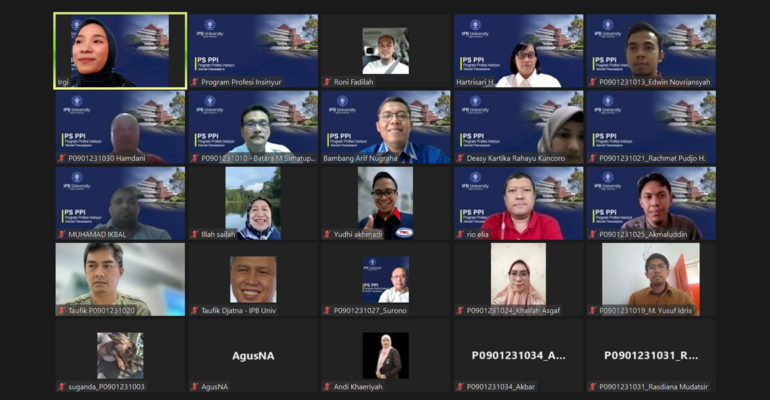SPs IPB University Professional Engineer Program Holds Public Lecture on Engineering in the Field of Animal Science and Industry

The Professional Engineer Program (PPI) of the Graduate School (SPs) of IPB University again held a public lecture with the theme Best Practice of Engineering Practices in Animal Science and Engineering Practices in Industry. This activity was held online, some time ago.
Prof Muhammad Romli, The Chairman of the PPI Study Program of SPs IPB University explained that the theme of this public lecture on the engineering profession is one of the three compulsory courses of the PPI study program, namely the courses on engineering ethics, occupational safety, and environmental health.
“We hope that this public lecture can refresh and remind us of the relevance and importance of professionalism aspects to carry out the duties and roles of engineers in work,” he said.
Deasy Kartika Rahayu Kuncoro, Secretary of the PPI Study Program, said PPI is a higher education program after the undergraduate program to form engineering competence organized by universities (PT) in collaboration with related ministries of PII and industry, after obtaining permission from the Minister.
“The professional engineering degree is given by universities in collaboration with related ministries and PII and can be achieved through regular mechanisms and recognition of prior learning or RPL,” she said.
Ir Roni Fadillah said that the first engineering benchmark must have good knowledge, abilities, skills, wisdom, experience, and work attitude.
“Currently, the most popular development in the poultry industry is the closed house. The basic principle of a closed house is to remove toxic gases and hot air produced from the body and feces of chickens and replace it with fresh air, thus creating an environment that suits the needs of chickens,” he said.
Meanwhile, Bambang Arif explained that food safety is a shared responsibility between the government, businesses, and consumers.
“The government needs to ensure food safety and food quality, and business actors also participate in ensuring food safety and quality produced and distributed, as well as consumers who have the right to safe, quality and quality food,” he explained.
He added that the overview of the crab industry in Indonesia currently has significant value in the global seafood market. “Crab fisheries are managed collaboratively by involving various stakeholders, including how the supply chain can participate in the management process,” he concluded. (HBL/Lp) (IAAS/TNY)



